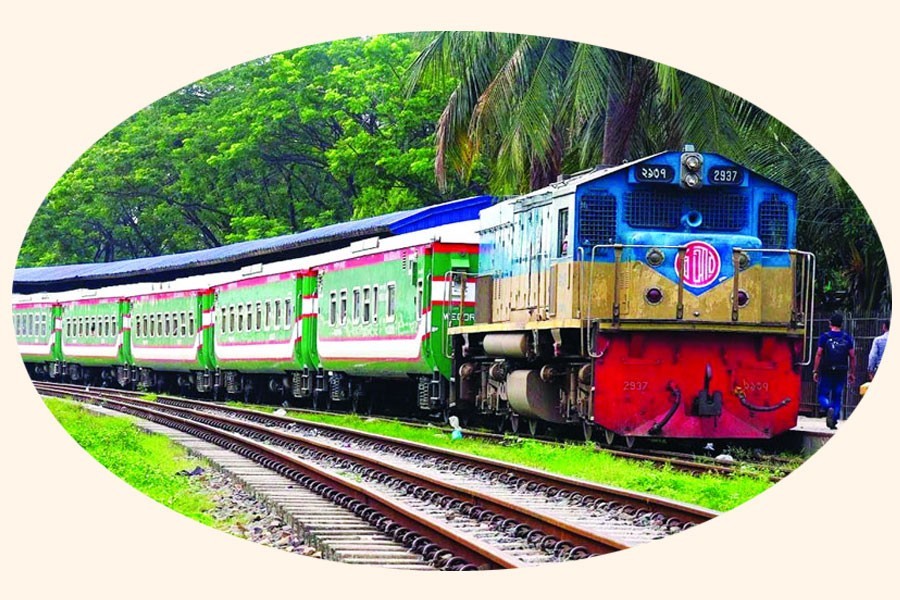Two vital railway projects worth around Tk 300 billion seem to have derailed before whistle-start as China decides to cease funding following downward cost revision of the works.
Sources say tenures of the projects expired through exhaustive negotiations and procrastination -- and, finally, a recast of the project formats gets underway.
Last week, Bangladesh Railway sent a revised preliminary development project proforma (PDPP) for Akhaura-Sylhet dual-gauge rail-track construction, one of the projects, to the Economic Relations Division (ERD).
The tenure of this one is rescheduled, and now the implementation period will be January 2022 to June 2026.
The project was approved in 2016 and originally scheduled to be completed by 2020.
"We received the letter from Bangladesh Railway just few days ago," a senior official of the ERD, preferring anonymity, told the FE on Friday, mentioning that it has yet to start discussion with any development partner on the funding issue.
Costs of both of these projects were revised by the government after awarding contracts to Chinese firms, and as cost slashed, the contractors declined to do the job, officials said.
In its letter to the ERD, sent on February 3, BR said the project cost of the Akhaura-Sylhet dual-gauge rail project is slashed to Tk 126 billion with Tk 112 billion being project assistance.
Bangladesh negotiated with China the implementation of this project and signed a loan agreement wherein the project cost was estimated at Tk 161 billion of which China agreed to lend Tk 106 billion.
China Railway Construction Bridge Engineering Bureau Group Limited (CRBG) was awarded job for the Sylhet-Akhaura project but they decided to withdraw as the project cost was trimmed after the loan agreement.
Earlier on November 4, Bangladesh Railway wrote a letter to the ERD to seek assistance from Japan or any other source for funding the TK 145 billion Joydevpur-Iswardi rail-track project as China had declined to finance the project after a prolonged negotiation.
The tenure of the project was July 2015 to December 2019.
The project was approved in the ECNEC on November 4, 2018 and it was on the list of the projects to be funded by China.
China Railway Engineering Construction Company was selected for implementing the project.
Bangladesh Railway, the implementing agency of the project, is also constructing a rail bridge over the Jamua River through which this rail track will pass.
Japan International Cooperation Agency (JICA) is funding the Jamuna Rail Bridge project and the construction work has already started.
Bangladesh Railway is thus left in a quandary now as it seems that the bridge might be completed before the rail line on both sides can be rolled out.
Of late, BR plans to complete the eastern part of the line from the Jamuna Rail Bridge which connects Joydevpur. The western part of the line starts from Iswardi to end at the bridge.
"As JICA is funding the rail bridge, which conjuncts the double track on both sides, we think approaching the Agency for funding the rail-track project is very logical," an official of the Ministry of Railways told the FE.
According to BR the Joydevour-Iswardi double-track rail line is crucial to transportation network to and from the northern region of the country.
Currently there is a rail track on Jamuna Bridge but it apparently becomes an extra burden on the bridge and the train speed is very slow on this single track.
The Jamuna rail bridge will be exclusive for rail transportation and the frequency and speed of trains will be manifold when the Joydevour-Ishardi rail track will be completed.
The government will provide Tk 5,493 crore for the project while it seeks Tk 8,756 crore in foreign assistance for the project.
The length of the track is 173 kilometres and the double-track line will run besides the existing single track, officials say.
Currently, 12 intercity trains run on this route linking vast northern-and northwestern part of the country with the capital.
The proposed double-track rail run will enable the trains to have a maximum speed of 120 kilometres per hour, the officials say, adding that the train-travel time between Dhaka and Rajshahi will be reduced to 4 hours from the present 6.5 hours.
Travel time between Dhaka and Khulna will also be shortened to 8 hours from present 10 hours.


